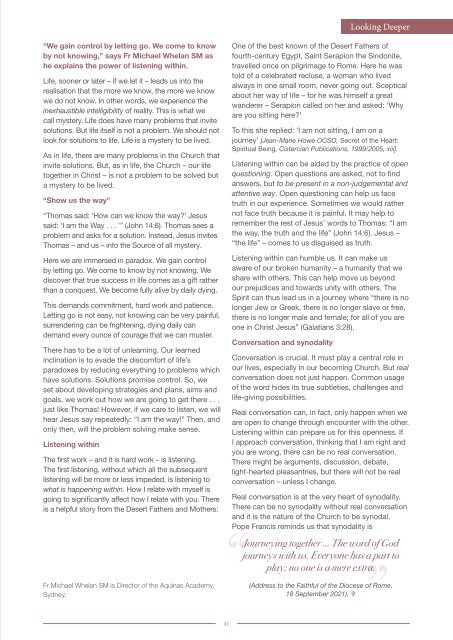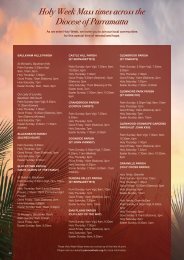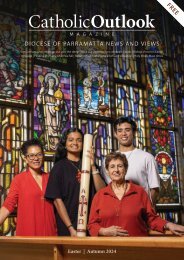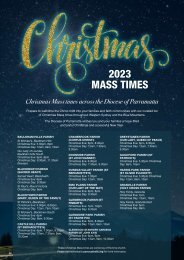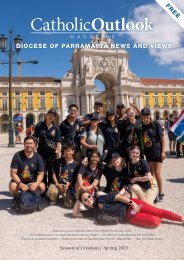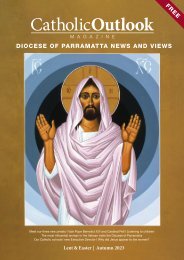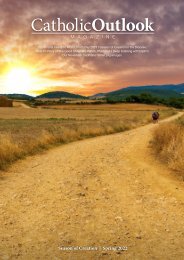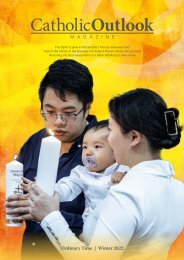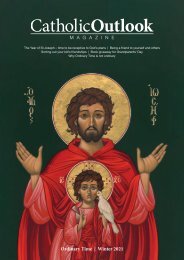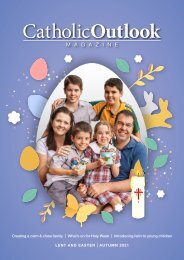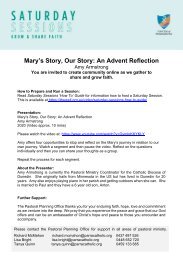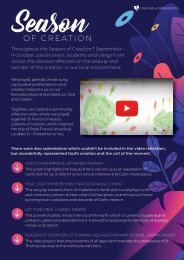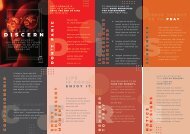Catholic Outlook Magazine | Ordinary Time| 2023 Issue
- No tags were found...
You also want an ePaper? Increase the reach of your titles
YUMPU automatically turns print PDFs into web optimized ePapers that Google loves.
Looking Deeper<br />
“We gain control by letting go. We come to know<br />
by not knowing,” says Fr Michael Whelan SM as<br />
he explains the power of listening within.<br />
Life, sooner or later – if we let it – leads us into the<br />
realisation that the more we know, the more we know<br />
we do not know. In other words, we experience the<br />
inexhaustible intelligibility of reality. This is what we<br />
call mystery. Life does have many problems that invite<br />
solutions. But life itself is not a problem. We should not<br />
look for solutions to life. Life is a mystery to be lived.<br />
As in life, there are many problems in the Church that<br />
invite solutions. But, as in life, the Church – our life<br />
together in Christ – is not a problem to be solved but<br />
a mystery to be lived.<br />
“Show us the way”<br />
“Thomas said: ‘How can we know the way?’ Jesus<br />
said: ‘I am the Way . . . ’” (John 14:6). Thomas sees a<br />
problem and asks for a solution. Instead, Jesus invites<br />
Thomas – and us – into the Source of all mystery.<br />
Here we are immersed in paradox. We gain control<br />
by letting go. We come to know by not knowing. We<br />
discover that true success in life comes as a gift rather<br />
than a conquest. We become fully alive by daily dying.<br />
This demands commitment, hard work and patience.<br />
Letting go is not easy, not knowing can be very painful,<br />
surrendering can be frightening, dying daily can<br />
demand every ounce of courage that we can muster.<br />
There has to be a lot of unlearning. Our learned<br />
inclination is to evade the discomfort of life’s<br />
paradoxes by reducing everything to problems which<br />
have solutions. Solutions promise control. So, we<br />
set about developing strategies and plans, aims and<br />
goals, we work out how we are going to get there . . .<br />
just like Thomas! However, if we care to listen, we will<br />
hear Jesus say repeatedly: “I am the way!” Then, and<br />
only then, will the problem solving make sense.<br />
Listening within<br />
The first work – and it is hard work – is listening.<br />
The first listening, without which all the subsequent<br />
listening will be more or less impeded, is listening to<br />
what is happening within. How I relate with myself is<br />
going to significantly affect how I relate with you. There<br />
is a helpful story from the Desert Fathers and Mothers:<br />
Fr Michael Whelan SM is Director of the Aquinas Academy,<br />
Sydney.<br />
One of the best known of the Desert Fathers of<br />
fourth-century Egypt, Saint Serapion the Sindonite,<br />
travelled once on pilgrimage to Rome. Here he was<br />
told of a celebrated recluse, a woman who lived<br />
always in one small room, never going out. Sceptical<br />
about her way of life – for he was himself a great<br />
wanderer – Serapion called on her and asked: ‘Why<br />
are you sitting here?’<br />
To this she replied: ‘I am not sitting, I am on a<br />
journey’ [Jean-Marie Howe OCSO, Secret of the Heart:<br />
Spiritual Being, Cistercian Publications, 1999/2005, xiii].<br />
Listening within can be aided by the practice of open<br />
questioning. Open questions are asked, not to find<br />
answers, but to be present in a non-judgemental and<br />
attentive way. Open questioning can help us face<br />
truth in our experience. Sometimes we would rather<br />
not face truth because it is painful. It may help to<br />
remember the rest of Jesus’ words to Thomas: “I am<br />
the way, the truth and the life” (John 14:6). Jesus –<br />
“the life” – comes to us disguised as truth.<br />
Listening within can humble us. It can make us<br />
aware of our broken humanity – a humanity that we<br />
share with others. This can help move us beyond<br />
our prejudices and towards unity with others. The<br />
Spirit can thus lead us in a journey where “there is no<br />
longer Jew or Greek, there is no longer slave or free,<br />
there is no longer male and female; for all of you are<br />
one in Christ Jesus” (Galatians 3:28).<br />
Conversation and synodality<br />
Conversation is crucial. It must play a central role in<br />
our lives, especially in our becoming Church. But real<br />
conversation does not just happen. Common usage<br />
of the word hides its true subtleties, challenges and<br />
life-giving possibilities.<br />
Real conversation can, in fact, only happen when we<br />
are open to change through encounter with the other.<br />
Listening within can prepare us for this openness. If<br />
I approach conversation, thinking that I am right and<br />
you are wrong, there can be no real conversation.<br />
There might be arguments, discussion, debate,<br />
light-hearted pleasantries, but there will not be real<br />
conversation – unless I change.<br />
Real conversation is at the very heart of synodality.<br />
There can be no synodality without real conversation<br />
and it is the nature of the Church to be synodal.<br />
Pope Francis reminds us that synodality is<br />
Journeying together … The word of God<br />
journeys with us. Everyone has a part to<br />
play; no one is a mere extra.<br />
(Address to the Faithful of the Diocese of Rome,<br />
18 September 2021). <br />
41


